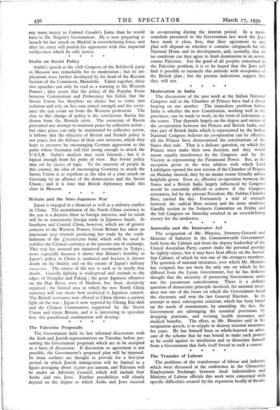Moderation in India The discussions of the past week at
the Indian National Congress and at the Chamber of Princes have had a direct bearing on one another. The immediate problem before India is whether the new Constitution, working well in the provinces, can be made to work, in the form of federation, at the centre. That depends largely on the degree and nature of the co-operation between the Princes and British India, and that part of British India which is represented by the Indian National Congress believes no co-operation can be effective till the Princes have democratised the constitutions of the States they rule. That is a delicate question, on which the Princes must make their own decision, and they would resent equally interference by the Congress and by the Viceroy as representing the Paramount Power. But, as the reception given to the wise address with which Lord Linlithgow opened the new session of the Chamber of Princes on Monday showed, they by no means resent friendly advice helpfully given. Even so, effective co-operation between the States and a British India largely influenced by Congress Would be extremely difficult to achieve if the Congress extremists, led by the present President, Mr. Subhas Chandra Bose, carried the day. Fortunately a trial of strength between the radical Bose section and the more moderate Gandhi section in the Subjects Committee on Friday and the full Congress on Saturday resulted in an overwhelming victory for the moderates. * * * *










































 Previous page
Previous page